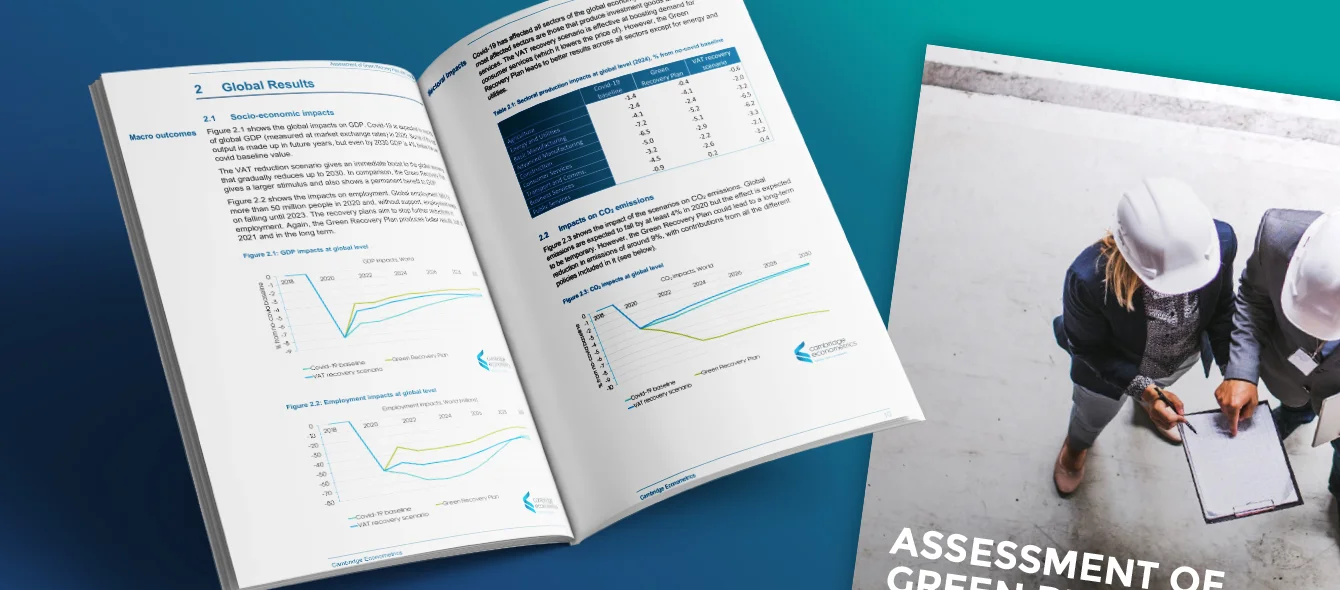Back in the spring, a slew of governments around the world launched economic stimulus packages designed to cushion the economic impact of the coronavirus pandemic. This could be followed by further aid. Many are calling for the funds to be invested above all in the energy transition, with a view to making the economy more sustainable. British think-tank Cambridge Econometrics looked into this demand, keeping overall economic output, the labour market and greenhouse gas emissions in mind. To this end, the econometric experts modelled three future scenarios through to 2030. They then compared them to a forecast of the economic development assuming the corona crisis never happened.
In the business as usual scenario, the countries do no more than provide the economic aid introduced by the time the study was prepared. The VAT scenario reduces value-added tax by five percentage points from 2021 to 2024. Scenario number three, the Green Recovery Plan, increases expenditure on renewable energy and the resulting grid expansion as well as on the energetic optimisation of buildings. Added to this is a state rebate when buying electric cars and planting ten billion trees around the globe. Costs incurred by the state are the same in the latter two scenarios.
Differences from one country to the next
The authors simulated scenarios for the entire world, the EU and certain countries, i.e. Germany, Spain, Poland, the United Kingdom, the USA, Japan and India. As expected, this yielded disparate results. For instance, the differences among the three scenarios in the United Kingdom are much smaller than in other countries. “One reason for this is that reducing VAT in the UK’s service-oriented economy is particularly effective,” the study claims.
Of notable mention is that in the simulations for Germany, both the targeted subsidisation and VAT reduction lead to very quick and strong improvements for both the economy and the labour market. However, the GPR scenario is more beneficial across all branches of industry over the entire period, the sole exception being that revenue in the energy sector suffers under gains in energy efficiency slightly more than it benefits from rising demand caused by electric vehicles. One of the main reasons for this is that demand for energy drops as buildings become more energy efficient.
Green Recovery Plan has biggest impact worldwide
Despite the host of differences, the bottom line are the commonalities reflected on both the global and EU level. In all six countries, the economy recovers more quickly in the GRP and VAT scenarios than it would without taking additional measures. Moreover, for the by far greater part of the forecast horizon, the GRP scenario fares better than the VAT scenario – in terms of both job figures and overall economic output.
It is no great surprise that the picture in terms of carbon dioxide emissions is much clearer. Whereas they sink much more the world over in the GRP scenario than when doing business as usual, fuelled by the faster upturn in the wake of a VAT reduction, they exceed those of the business as usual scenario especially in the early 2020s.
Conclusion: The GRP scenario is no all-purpose weapon
Although the GRP scenario achieves the best results nearly without exception, the authors interpret the differences among the countries to mean that the measures should be adapted to each of their economic conditions.
They find that the measure with the single-largest effect on economic performance and job numbers is the rebate on electric vehicles. However, they do not recommend it in view of greenhouse gases, as the discount is only suitable for reducing emissions on the back of a sustainable electricity mix.
The final conclusion drawn by the authors is that, while the GRP scenario created for the study may not be the optimal solution for every country, it is more promising in all countries considered than only decreasing VAT.
